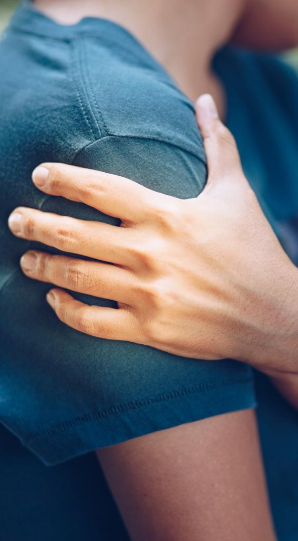What is a Rotator Cuff Tear?
The rotator cuff is a group of four muscles and associated tendons that are critical to function of the shoulder joint. They work to initiate movement in the shoulder, and stabilise the joint during movement. Each of these muscles and tendons can be damaged. A partial tear occurs when there is damage or fraying of the tendon, or a complete tear occurs where the tendon is completely detached from the bone.
Rotator cuff tears are quite common. They are often seen in people who make repetitive overhead movements with their arms, such as trade workers and people who play sports.
A traumatic rotator cuff tear can also result from a fall, or lifting a heavy item. However, ‘wear-and-tear’ rotator cuff tears (with no apparent cause) are the most common presentation of this injury. They can occur at any age but are more common in the elderly.

Causes of a Rotator Cuff Tear
- Physically intensive labour that involves reaching overhead
- Wear-and-tear from age
- Bony growths or spurs that affect the shoulder tissue.
- Sports injuries, especially from throwing or racquet sports that involve overhead movements
Symptoms of a Rotator Cuff Tear
- Pain when moving your arm
- Stiffness or difficulty lifting your arm
- Weakness in your shoulder
- Catching, clicking or popping sounds when lifting your arm.
Diagnosing a Rotator Cuff Tear
Your Physiotherapist or GP will often diagnose a rotator cuff tear. They will conduct a physical examination and ask you to complete a few simple muscle strength tests. This examination is usually enough to confirm the diagnosis.
The next step is to confirm the diagnosis with an x-ray and ultrasound. Dr Ward may also refer you for an MRI. These tests will help clarify the extent of the tear and help identify any underlying structural cause.

Treating a Rotator Cuff Tear
For non-acute tears, conservative treatment with a Physic program will help restore function and relieve symptoms in 2 out of 3 patients. For acute tears you may need to discuss surgical treatment and an early referral to Dr Ward would be appropriate. For those who need full strength in their arm for everyday work or for those who like to to compete in sport, an early referral to Dr Ward to consider surgical treatment may be appropriate. Surgery for rotator cuff tears aims to remove the cause of the tear and to reattach any torn tendons to the bone, to restore shoulder function.
Non-surgical treatment of rotator cuff tears
Nonsurgical treatments are focussed on trying to restore shoulder function with pain relief and an exercise program. Treatment may include:
- Rest and ice
- Anti-inflammatory & pain medication
- Cortisone injections as a form of pain relief
- Physiotherapy to strengthen the arm and restore shoulder function. This may take 3 months to see improvement.
Surgical Treatment of Rotator Cuff tears
Arthroscopic tendon repair
Dr Ward will typically use arthroscopic (keyhole) surgery to treat your rotator cuff tear. Dr Ward will make several small incisions in the skin around the shoulder, then use a small fibreoptic camera and specialised tools to repair the affected rotator cuff tendon(s) to the bone.
Surgical treatment of rotator cuff tears
Mini-Open tendon repair
In some more severe or complex cases, Dr Ward may need to use a slightly larger skin incision to better access the repair site. This mini-open surgery will not extend your recovery time, if it is required.
Tendon transfer
In younger patients with irreparable rotator cuff tears, Dr Ward may suggest a tendon transfer. This will allow him to restore shoulder function by transferring a healthy tendon taken from elsewhere in your shoulder.
Reverse Shoulder replacement
For more chronic tears in older patients, Dr Ward might recommend a reverse total shoulder replacement. This will allow restoration of your shoulder function and pain relief. This type of replacement allows movement of the shoulder using the larger muscles of the shoulder girdle. Dr Ward has particular expertise in this procedure and it is the most common form of shoulder replacement performed in Australia.